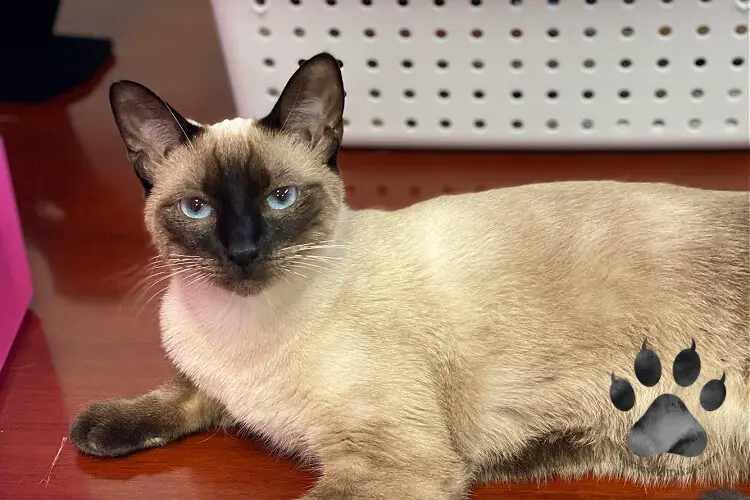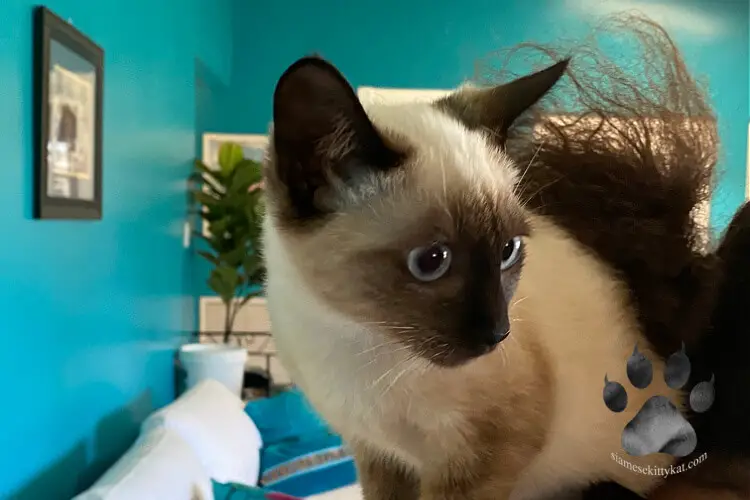One intriguing thing about Siamese cats is their moods can swing from sunny to gloomy. Why are they moody?
Siamese cats’ feelings, as well as their behavior, shift quite often. They are moody sometimes and cheery other times. They can have happy, carefree moments and downright depressing ones, all on the same day.
What could be causing their mood swings? Let’s find out!
Why Is My Siamese Cat Moody?
We know our cats are in a bad mood when they make grumpy faces and excessive meowing.
I have had Siamese cats my entire life, and I can not deny that they can be moody sometimes.
Batman, one of my Siamese cats now, gets moody at times. He enjoys being the center of attention and sitting on my lap first thing in the morning.
Batman only watches me from a distance and does not respond to my calls when the afternoon arrives. He turns into the world’s quietest cat for some reason, and I begin to worry that something is wrong.
Your cat may be moody for various reasons, including:
1. Your cat feels upset because he did not get to eat at his regular time.
2. He needs to drink more water.
3. You should have checked in with him for a while.
4. Your cat does not feel cozy in his bedding.
5. He’s sleep deprived.
6. He dislikes using the litter box.
7. Your cat is not getting enough physical and mental stimulation.
8. He craves more playtime.
9. He suffers from long-unnoticed pain or injury.
Bring your cat to the vet to rule out health problems if he’s often irritable and grumpy.
Do Siamese Cats Have Behavioral Issues?

Being around Siamese cats is a lot of fun. They are a never-ending source of entertainment for their owners. Yet, they engage in undesirable behaviors that are sometimes confusing.
Siamese cats have behavioral issues that owners often mention. They are as follows:
1. They Are A Hyperactive Bunch.
Siamese cats are active. These cats get over-excited and impulsive because of their high energy levels.
They don’t get tired that easily.
Why are my cats acting so hyper? I often asked this question when I first got Siamese cats. It is true; they are hyperactive and will not settle down instantly whenever I tell them.
Almost every Siamese cat I have ever owned has been a runner, eager to catch and pounce on anything that moves. They are also acrobatic masters. They often launch themselves off couches and other soft surfaces!
2. They Get Attached To Their Humans.
Most people assume that cats are independent of their owners. They may appear independent, but this is not true with Siamese cats. These cats can form strong bonds of affection with their owners.
Siamese cats may have deep, obsessive attachments to their human companions. They develop levels of possessiveness that might be unhealthy in the long run.
Siamese cats can have three types of attachment behavior. These are:
Siamese cats with this type of attachment welcome us with open arms. They allow physical contact after being alone for some time.
They do not hold grudges and can divert their attention to playing after we comfort them. They recover faster from anxiety when we are nearby.
Cats with this attachment become clingy after being lonely for a while. They need constant attention and like to rest on their laps most of the time.
Siamese cats with this attachment get stressed after being lonely for a while. They hide and run away from physical contact to let us know they are in distress and don’t want any social contact.
Cats with this attachment show various contradictory behaviors that may confuse us. They demand attention from us but fight it off at other times.
3. They Are Prone To Jealousy.

Yes, these cats get the jealousy bug sometimes! They experience bouts of jealousy now and then.
They develop feelings of jealousy when they perceive an external threat or insecurity. They get jealous when we pay more attention to something besides them. They also act jealous when there is a new family member at home.
4. They Crave Being The Center Of Attention.
Siamese cats will do anything to get the spotlight on them in some cases. They often try to get our attention by pawing and making a lot of noise. Physical or emotional factors can be the root of this attention-seeking behavior.
I remember Batman, my cat, getting hooked on a particular treat. He displayed attention-seeking behavior three days in a row, begging for the treat. Although I would have loved to give Batman more, I knew it was not healthy to eat a lot of treats.
I tried to make him eat four balanced meals a day, rather than three big ones, so he would not think about treats as much. It was a successful move, and he began to show less attention-seeking behavior.
5. They Get Bored Fast.
A Siamese cat’s attention span is short. They have difficulty staying away from boredom, especially since they are active. It is no surprise that boredom is such a common problem for them.
Siamese cats become naughty when they get bored. They feel compelled to release their pent-up energy. Somehow, they believe they must release the energy built up inside them.
I ensure Batman and Robyn have productive playtime daily to keep them from getting bored.
6. They Experience Separation Anxiety Sometimes.
Siamese cats quite often have difficulty being alone. They become distressed and develop separation anxiety if left unattended for too long. They often worry that they will be alone since they are now used to our care.
They are also prone to depressive symptoms when they get less time and attention from us.
Final Thoughts
Many factors can make your cat moody and irritable. Keep a close eye on any changes in your cat’s behavior, so you can figure out what to do. Understand the cause of your cat’s mood and determine whether it is typical. Also, give your cat plenty of attention and playtime. Time well spent with your cat can have far-reaching positive effects!
Want to immerse yourself more in the captivating world of Siamese cats? I’ve got all the information you need from their distinct color points to their fun personalities: Siamese Cats: Unique Features and Personality

